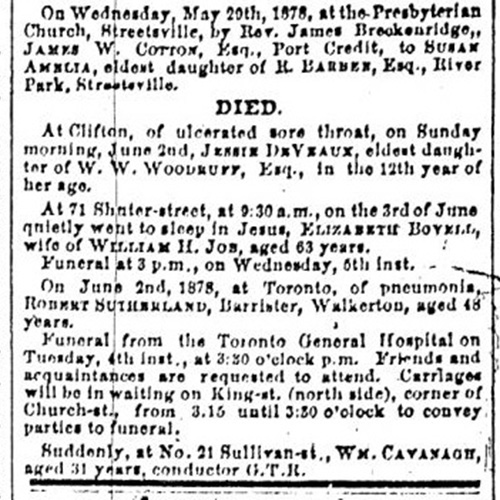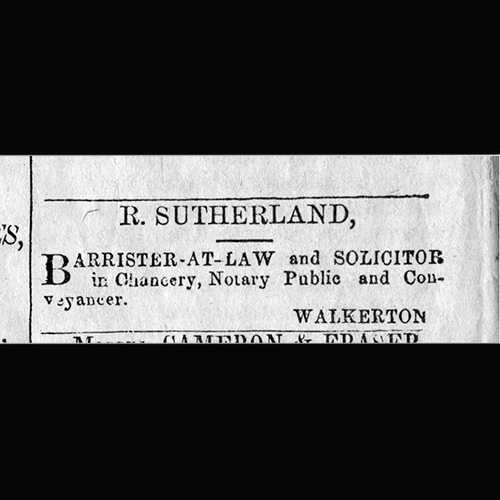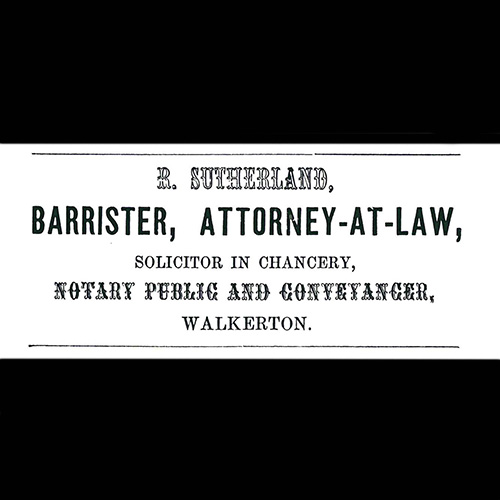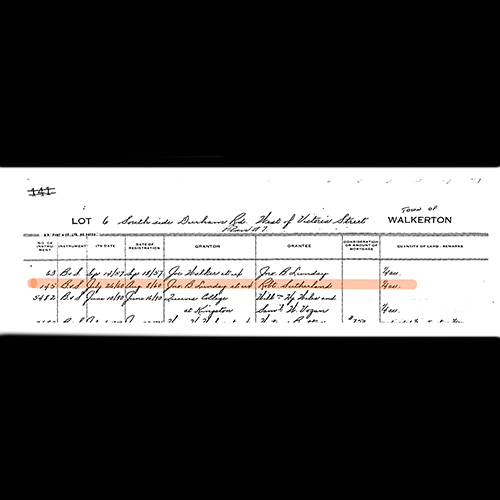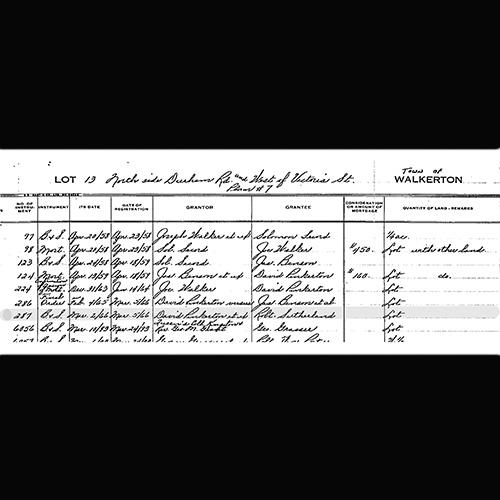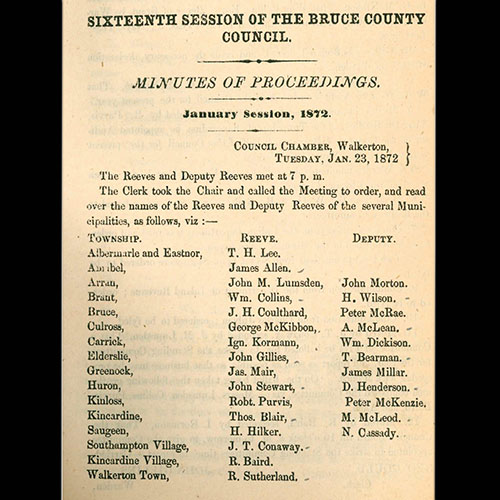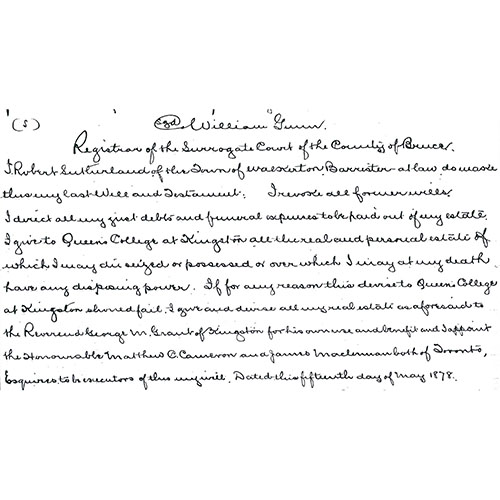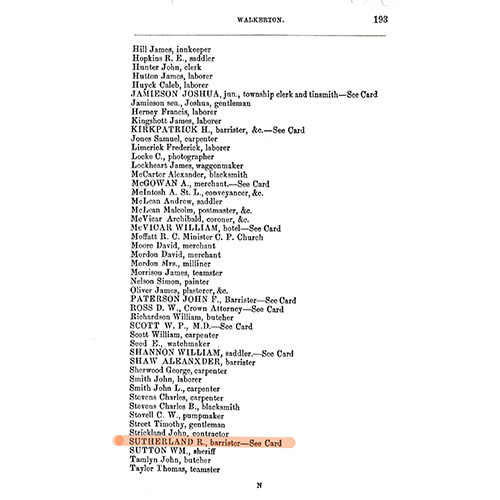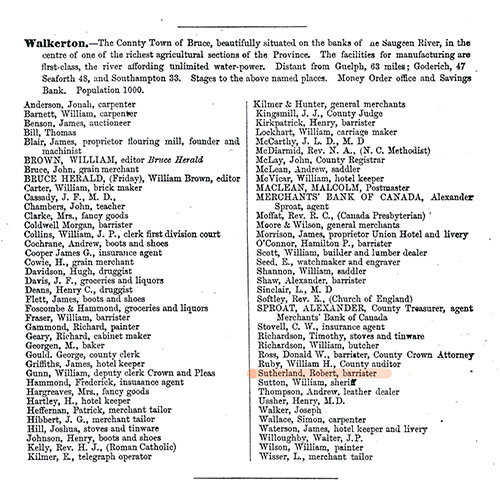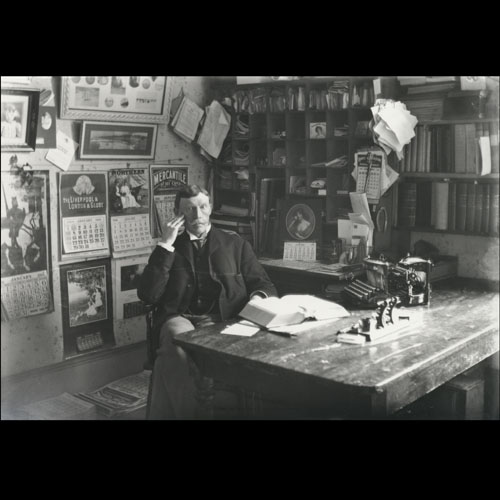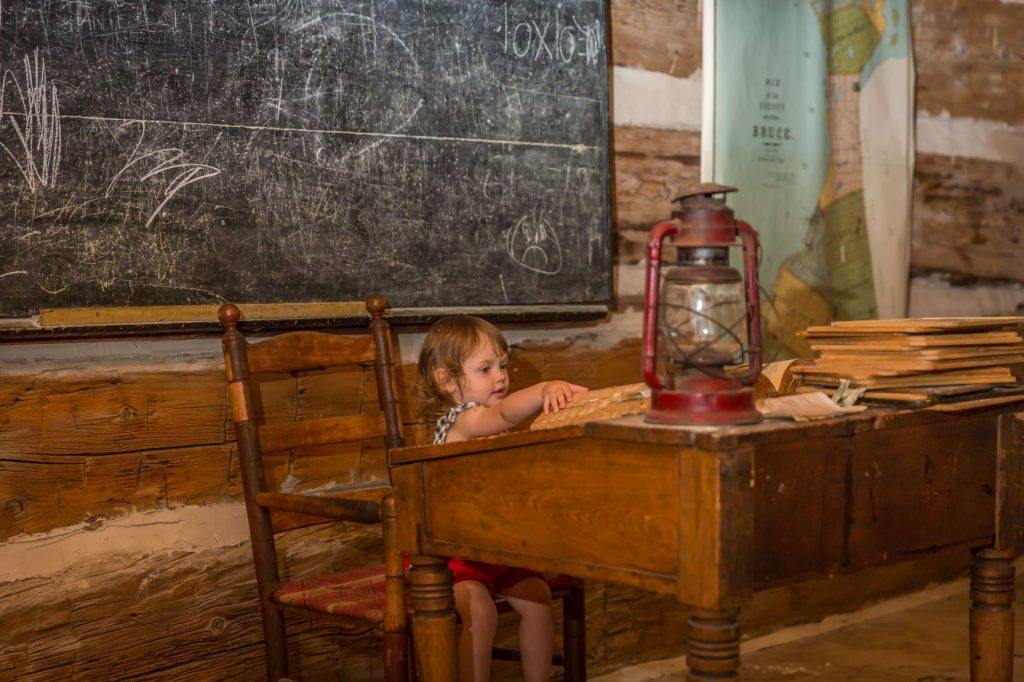For almost two decades Bruce County was home to one of Canada’s once forgotten revolutionaries. Robert Sutherland was Canada’s first Black university graduate and first Black lawyer, who lived and established a successful law practice in Walkerton for most of his adult life. For decades Sutherland’s achievements and career went largely overlooked, however in recent years historians have pieced together Sutherland’s life to acknowledge and honour his momentous accomplishments.
Robert Sutherland was born c. 1830 in Jamaica. According to many sources, he was born to a Scottish father and a freed African-Jamaican mother. Sutherland arrived in Kingston, Canada West (now Ontario) in 1849 to attend Queen’s University. At that time Queen’s was a young Presbyterian college and the closest Presbyterian school to the West Indies. Sutherland became Queen’s sixtieth registered student within a class of fourteen freshmen.
Deidré Rowe Brown argues that Sutherland’s father must have been a man of means and diplomatic influence – presumably a Presbyterian minister or a plantation owner – enabling him to send his son to study abroad and to support him throughout his studies and career. She also suggests that Sutherland might have had a Canadian benefactor evidenced by the “opportunities that were afforded him and the company he kept”.
Sutherland excelled in his studies at Queen’s winning fourteen awards throughout his tenure, including the general merit award in Latin. He was also known for his adept debating skills and served as the treasurer of the Dialectic Society, the Alma Mater Society’s predecessor. It is believed that during his time in Kingston, Sutherland became acquainted with fellow student, James Maclennan, who later became a lawyer and judge of the Supreme Court of Canada. Sutherland and Maclennan remained lifelong friends.
Sutherland graduated from Queen’s university in 1852 with an honours in mathematics and classics, which was a notable achievement at that time. Sutherland also made history as the first Black person to attend and graduate from a university in Canada.
After graduating from Queen’s, Sutherland petitioned the Law Society of Upper Canada in Toronto to study Law at Osgoode Hall. Evidence of his petition is in the minutes of the Society’s Benchers meeting held on September 4, 1852, where he was examined in Latin and matriculation. On September 7, 1852, Sutherland was “admitted into the University Class as #276 on the Common Rolls of the Law Society of Upper Canada”. During his law studies Sutherland completed examinations and fulfilled articling requirements while apprenticing with a practicing lawyer. Where and who Sutherland apprenticed is unknown, however, Rowe Brown once again argues that it was perhaps his father’s or benefactor’s connections that allowed him to secure an articling position.
Like his time at Queen’s, Sutherland was an involved student and held a membership with the Osgoode Club, a student and professional group that had members present papers, participate in debates, and advocate for their legal education and interests at Osgoode Hall. The February 20, 1885, Osgoode Club meeting minutes document that Sutherland presented an essay on real property.
Sutherland next appears in the Society’s Benchers minutes on November 27, 1855 when he was examined and called to the Bar by the Law Society of Upper Canada. His name appears as number 583 on the Barristers’ Roll. Upon graduation Robert Sutherland became Canada’s first Black lawyer.
Robert Sutherland first set up a law practice in Berlin, Ontario (now Kitchener). Advertisements for Sutherland as a barrister, conveyancer, solicitor in the Court of Chancery, and attorney at law began to appear in the local newspaper, the Berlin Telegraph, in 1856. His name is also mentioned as counsel in a bankruptcy case that was published in the March 1857 issue. Rowe Brown speculates that Sutherland established a law office in Kitchener due to its relatively high population of Black people at the time, many who were freed enslaved people. She believes that Sutherland used his law degree to help these individuals secure land titles, so they could have legal claim over their land.
He eventually left Kitchener in 1859 to open a practice in Walkerton. The April 12, 1859 issue of the Berlin Chronicle stated that Sutherland “gained the respect and friendship of all by his kindly manner and strict integrity.” It is apparent that he was well liked and respected within Kitchener and the surrounding area. The same year Sutherland wrote to the Attorney General, John A. Macdonald to express his interest in the position of Office of Clerk of the Peace and County Attorney for the County of Bruce. The request included signatures by the County’s magistrate, Reeve, and coroner, as well as fellow lawyers and members of Parliament. Sutherland was unsuccessful at securing this position.
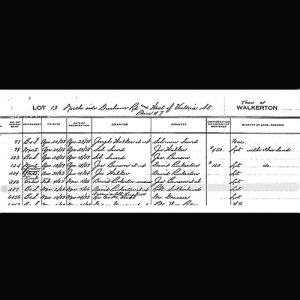
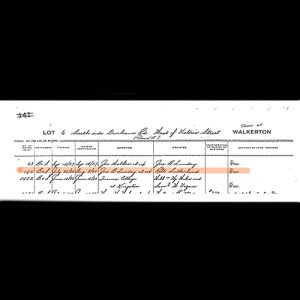
In 1860, Sutherland purchased ¼ of an acre of land at 249 Durham Street East, downtown Walkerton. In 1866, he purchased another property further west on the north side of Durham Street E. Both purchases were without mortgages, so the transactions were most likely paid in full with cash. Sutherland’s name appears in the 1871 Ontario census. Also living in the same household was, Jessie Hannah and two children Robert and Margaret Hannah. Jessie Hannah’s occupation is listed as servant, which was a rare luxury at this time.
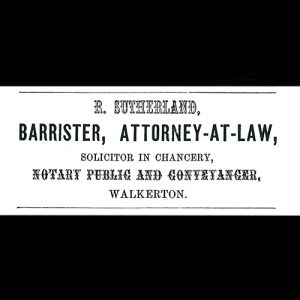
Sutherland maintained his law practice in Walkerton for almost twenty years, primarily working as a conveyancer, handling land title registrations, and preparing wills and indentures. According to the Mount Pleasant Group (which provides funeral and cemetery services), he continued to have links to the Underground Railroad, and the Black Diaspora while in Walkerton.
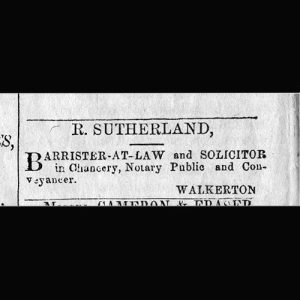
Robert Sutherland eventually ran for local government. In 1872 he was elected Reeve for the newly incorporated Town of Walkerton, becoming the first Black Reeve in all of Bruce County. During his time in local government, he represented Walkerton at Bruce County’s Council and served on the County’s Finance standing committee and was the chairman for the Salaries, and Gaol and Warden standing committees. Sutherland did not run again in 1873.
During a trip to Toronto in 1878, Sutherland contracted pneumonia, succumbing to the infection on June 2. He was buried on June 4 in Mount Pleasant Cemetery (Plot Q, Lot 30) in Toronto. Three weeks before his untimely death Sutherland drafted his will and left his entire estate of over $12,000 to Queen’s University, where evidently “he had always been treated as a gentleman.” This amount equaled the University’s yearly operating costs at the time and was the largest donation the University had received. Sutherland became the university’s first major benefactor, while simultaneously saving Queen’s from its ongoing financial troubles.
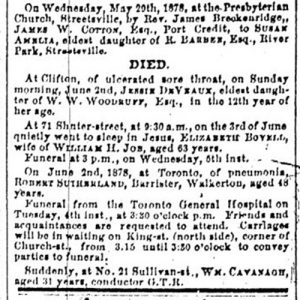
In 1973, the City of Kingston installed a plaque honoring Sutherland in Grant Hall on Queen’s University Campus. In 2009, after a student-led initiative, the Policy Studies building at the university was renamed Robert Sutherland Hall, honouring Sutherland’s trailblazing career and accolades. Queen’s continues to offer several prizes and awards named after Sutherland including, the Robert Sutherland Visitorship, The Robert Sutherland Prize, Robert Sutherland Award for Excellence in Debating, Robert Sutherland – Harry Jerome Entrance Award, Robert Sutherland Memorial Entrance Bursary, and The Robert Sutherland Fellowships. A plaque dedicated to Sutherland was also mounted in the Walkerton Courthouse.
Though much has been written on Sutherland’s remarkable achievements as Canada’s first Black university graduate, lawyer, Bruce County Reeve, and Queen’s first significant benefactor, it is also certain that he would have been subject to racism and discrimination throughout his life and was not granted every opportunity available to white settlers. Nevertheless, Robert Sutherland led a life that involved one pioneering achievement after the next, affluence, hard work, and community respect.
Sources:
Mount Pleasant Group. Robert Sutherland biography: R Sutherland (mountpleasantgroup.com), retrieved December 10, 2021.
Rowe Brown, Deidré. “Robert Sutherland: Celebrating the Legacy.” Queen’s Law Journal, vol. 35, no. 1, 2009, pp. 401-419.
Sutherland, Robert (c. 1830-1878): Sutherland, Robert (c. 1830-1878) | Queen’s Encyclopedia (queensu.ca), retrieved December 10, 2021.

